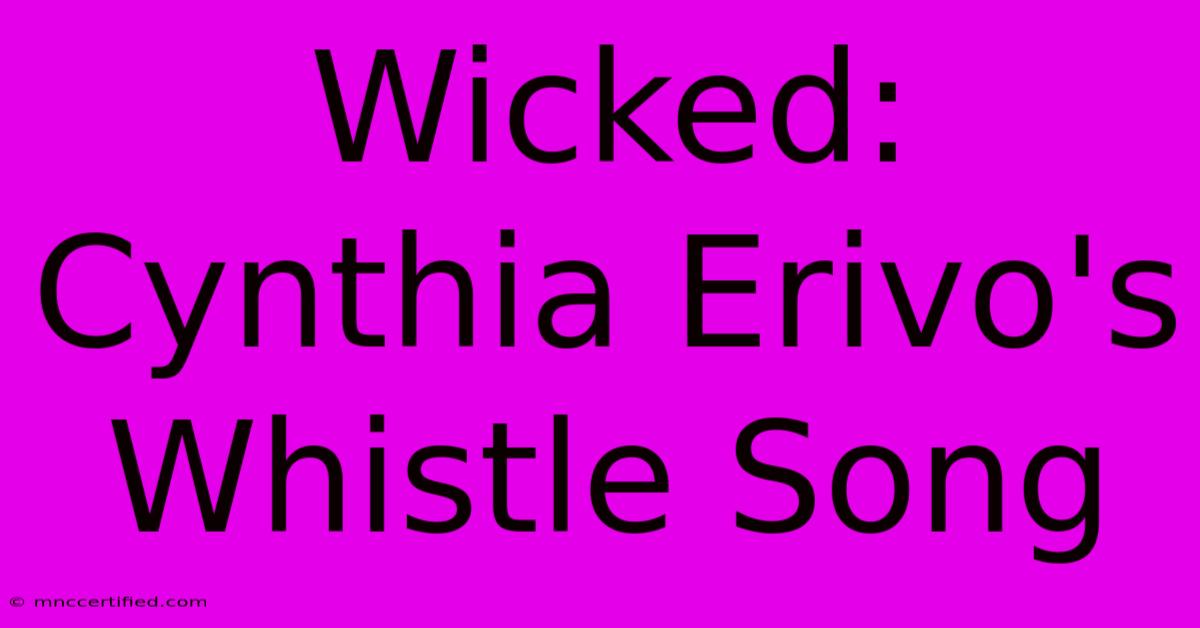Wicked: Cynthia Erivo's Whistle Song

Table of Contents
Wicked: Cynthia Erivo's Whistle Song – A Vocal Masterclass
Cynthia Erivo's performance as Elphaba in the 2023 film adaptation of Wicked has been met with widespread acclaim, and rightfully so. While her entire performance is captivating, one moment stands out as particularly breathtaking: her rendition of the infamous whistle song. This isn't just a song; it's a vocal tour de force, a display of technical prowess and emotional depth that perfectly embodies Elphaba's complex character. This article delves into the intricacies of Erivo's whistle song, exploring its significance within the narrative and analyzing the vocal techniques that make it so unforgettable.
The Significance of the Whistle in Wicked
The whistle itself is a significant element of Elphaba's character arc. It's a symbol of her magical power, her connection to the natural world, and her inherent otherness. The song isn't just about showcasing vocal ability; it's about conveying Elphaba's struggle to control her powers, her growing frustration with a world that misunderstands her, and her deep-seated yearning for acceptance. Erivo's interpretation perfectly captures this nuanced blend of power and vulnerability.
More Than Just a Trill: The Emotional Weight
What truly sets Erivo's performance apart is her ability to imbue the whistle song with immense emotional weight. It’s not just a technical display of vocal skill; she uses the song to communicate Elphaba's inner turmoil, her defiance, and ultimately, her profound loneliness. This emotional depth is what resonates with audiences on a visceral level, elevating the performance from a technical marvel to a truly moving artistic achievement. The nuances in her tone, the subtle shifts in volume and tempo, all work together to create a performance that is both powerful and heartbreaking.
Deconstructing Erivo's Vocal Technique
Erivo's execution of the whistle is nothing short of extraordinary. It requires an incredible level of control, precision, and breath support. Let's break down some of the key vocal techniques likely employed:
- Breath Control: Sustaining the high notes and rapid trills requires exceptional breath control. Erivo demonstrates mastery over this aspect, allowing her to maintain a consistent tone and power throughout the extended performance.
- Vocal Placement: The placement of her voice is crucial. It's likely she utilizes a combination of head and mask resonance to achieve the clear, bright tone characteristic of her whistle.
- Flexibility and Agility: The whistle requires impressive vocal flexibility and agility. Erivo effortlessly transitions between different notes and rhythms, showcasing remarkable control over her vocal apparatus.
- Emotional Expression Through Tone: Erivo’s control extends beyond the technical aspects. She uses subtle changes in tone and timbre to convey emotion, adding layers of meaning to the otherwise purely technical passage.
The Impact and Legacy of Erivo's Performance
Erivo's whistle song is already being hailed as iconic. It's a moment that will be discussed and analyzed for years to come, inspiring future generations of performers. Her interpretation not only redefines the possibilities of vocal performance in musical theatre but also enriches our understanding of Elphaba's character. This performance is a testament to her talent, dedication, and artistry.
Conclusion: A Masterclass in Musical Theatre
Cynthia Erivo's whistle song in the Wicked film is more than just a noteworthy performance; it’s a masterclass in musical theatre. It combines technical brilliance with profound emotional expression, solidifying her status as one of the most talented performers of our time. Her rendition will undoubtedly be remembered as a defining moment in the history of the musical and a testament to the power of a truly exceptional vocal performance. It’s a performance that deserves repeated listens and continued discussion within the broader context of musical theatre and vocal artistry.

Thank you for visiting our website wich cover about Wicked: Cynthia Erivo's Whistle Song. We hope the information provided has been useful to you. Feel free to contact us if you have any questions or need further assistance. See you next time and dont miss to bookmark.
Featured Posts
-
Venezuela Draws With Brazil In Home Match
Nov 15, 2024
-
Jalen Hurts Injury Report Eagles Qb Concussion
Nov 15, 2024
-
Thursday Night Football Eagles Commanders
Nov 15, 2024
-
Paddy Mc Guinness Reads Cop Story On C Beebies
Nov 15, 2024
-
Eagles Take Lead Hurts Shove Td
Nov 15, 2024